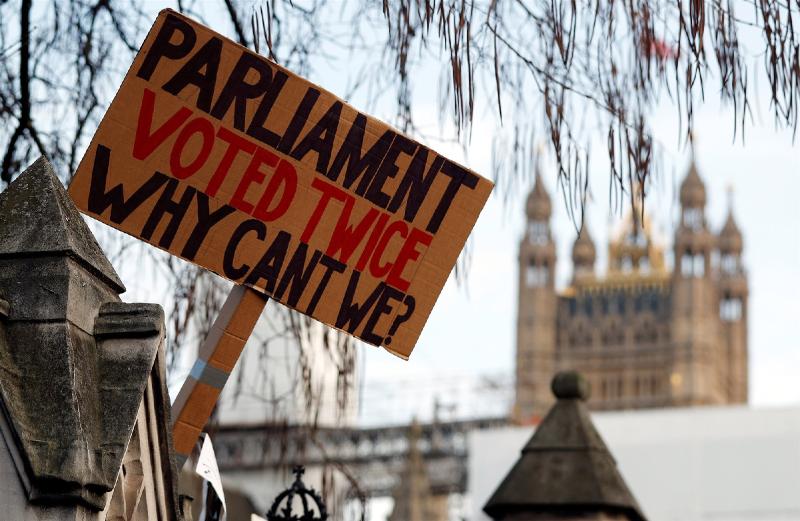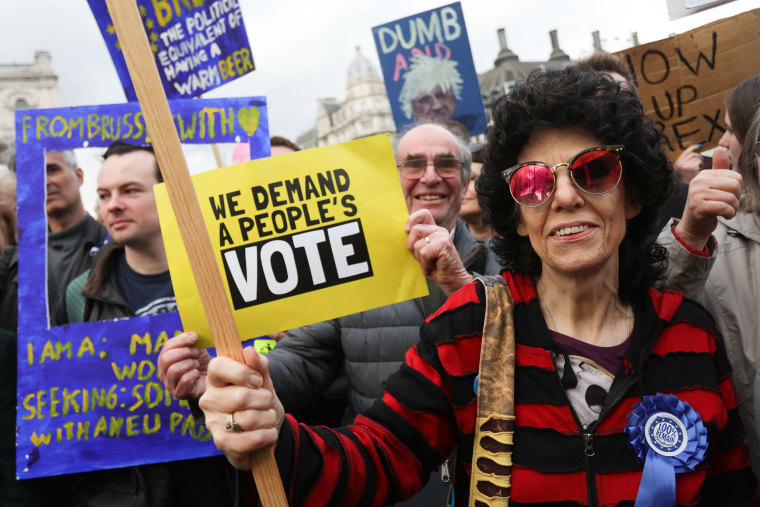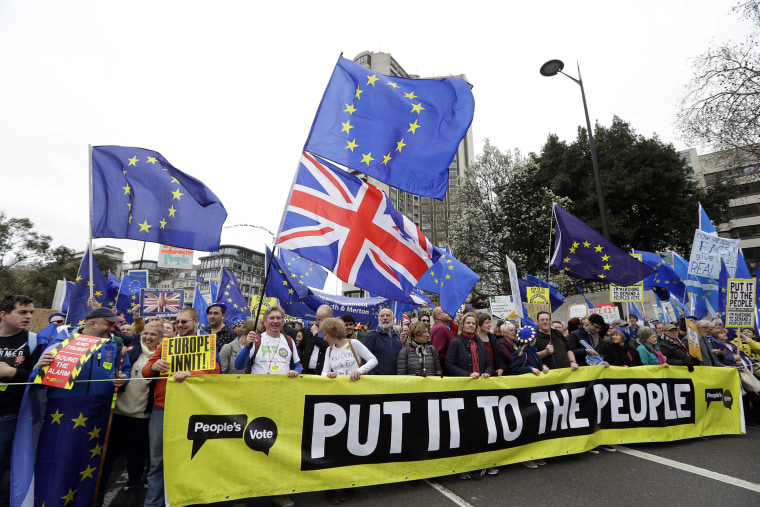The Brexit referendum helped break British politics. Could another one fix it?



LONDON — Britain is mired deep in its most serious political crisis in a generation.
Almost three years ago, the country voted in a referendum to leave the European Union . But with lawmakers deadlocked on the issue, many believe that the only way out of this morass is to ask the people again.
The idea has gained momentum in recent weeks, from a demonstration that flooded the streets of London last month to senior members of Prime Minister Theresa May's own government now saying a new referendum should be seriously considered.
Such a drastic move would provoke uproar among pro-Brexit supporters. However, the idea of holding another referendum now seems far less implausible than it did even a few weeks ago.
"There is no prospect of closure in the Brexit debate without respecting the right of voters to have the final say," said former Conservative lawmaker Stephen Dorrell, one of the prominent bipartisan voices behind the campaign for a so-called People's Vote.
He added: "It would show our country has finally come to its senses after a spasm that has undermined our democracy. "
The argument goes like this: The yes or no referendum in June 2016 showed that most people wanted to leave the E.U. — but it gave little idea what a post-Brexit Britain should look like.
Backers of another vote say any deal thrashed out by lawmakers should be put back to the electorate to make sure that the vision of the future is actually what they wanted.'
Opponents claim this is a nothing short of a conspiracy cooked up by those who want to cancel Brexit altogether. But supporters say that only a final, definite act of public endorsement can break the impasse.
Their cause has been boosted by the hundreds of thousands of demonstrators who marched through London last month calling for another referendum. Furthermore, a parliamentary petition to cancel Brexit altogether gained more than 6 million signatures.
FROM FANTASY TO 'CREDIBLE'
For a long time during this process, the idea of another referendum seemed far-fetched, a fantasy reserved for the pro-European fringes desperate for any excuse to remain in the E.U.
As recently as December, May outright rejected the idea, saying it would do "irreparable damage" to the public's trust in British politics. A month later, opposition leader Jeremy Corbyn bluntly said his Labour Party was "not supporting or calling for" another referendum.
Fast forward to this week and the picture has changed remarkably.
 The People's Vote march in London last month saw hundreds of thousands of demonstrators take to the streets. Isabel Infantes / AFP - Getty Images
The People's Vote march in London last month saw hundreds of thousands of demonstrators take to the streets. Isabel Infantes / AFP - Getty Images May is no longer ruling out the prospect of another vote, and her finance minister, Philip Hammond, told ITV News on Wednesday night that there was a "credible case" for one.
That this is even being discussed in the political mainstream shows how limited May's options have become .
Because the U.K. is so closely tied to the other 27 E.U. countries, its politicians have been trying to agree on a deal to ensure a smooth divorce as well as a clear path to a future relationship.
The prime minister's attempts to secure this have resulted in a stalemate in Parliament — where her plan has been rejected three times — and it has exacerbated bitter divisions within her Conservative Party, with lawmakers of all stripes blaming her for the chaos.
"I deeply regret the state of my party, a party that is in a profound state of existential crisis," said Dorrell, the former Conservative lawmaker.
SPEAKING WITH THE ENEMY
In a final throw of the dice, this week May entered into talks with Corbyn , a man on the far-left of his own Labour Party, and someone with whom she has spent the past few years trading vitriolic attacks.
These cross-party negotiations are now the focus of the Brexit debate. There is a deep sense of mistrust from both sides.
 Whether to hold a second referendum has become one of the main focal points of the Brexit debate. Kirsty Wigglesworth / AP
Whether to hold a second referendum has become one of the main focal points of the Brexit debate. Kirsty Wigglesworth / AP Some Conservatives are outraged at their leader cooperating with a "Marxist" and an "anti-Semite," as one lawmaker, Caroline Johnson, put it, referring to Corbyn's left-wing politics and lingering allegations that he has failed to tackle incidents of anti-Semitism within his ranks.
With the talks now underway, Corbyn himself is coming under pressure from all sides of his party about whether to demand a second referendum. There are also fears that the prime minister is laying a trap.
Although he campaigned limply to remain in the E.U. in 2016, Corbyn is widely believed to be a euroskeptic at heart. His party has been pulled in at least two directions.
Some lawmakers fear that any attempt to frustrate or cancel Brexit will incur a backlash from their working-class, pro-Brexit constituents, often in the north or midlands of England. Other more pro-European voices have appeared keen to drag Corbyn and his colleagues toward a softer approach.
Eight lawmakers have already quit the Labour Party over Brexit. Keen to prevent any more rebel departures, Corbyn now says that he backs a second referendum and ordered his lawmakers to vote for such a plan earlier this week.
BEST OF THREE?
Despite this apparent momentum, there are questions and potential pitfalls.
If there is another referendum, which question — or questions — would be on the ballot? The last one was a simple in or out choice. But now there are other options: May's deal, a so-called softer Brexit, a no-deal Brexit, or no Brexit at all.
Then there's the result. If it's a narrow vote to remain in the E.U. — a mirror image of the last one — many pro-Brexit supporters would see it as illegitimate.
"How many times are we going to vote? Is it going to be the best of three?" asked Northern Irish dockworker named David Henry, 59, during NBC News' Brexit road trip earlier this year .
A second referendum carries another wrinkle in that it would force Britain to participate in European elections in May. And even if the result is a decisive vote for staying in the E.U., some officials are worried this could inflame the already venomous atmosphere surrounding Brexit.
In December, Foreign Secretary Jeremy Hunt went as far as saying that attempting to reverse Brexit could risk "real social instability," possibly involving the kind of yellow-vest protests seen in France.




As Parlement votes over and over, people of the UK would like to do the same. Without a constitution like ours, this is a possibility. But just because it is possible, doesn't mean you that you should?
the people have voted and that vote should be honored
if they ignore the peoples vote there will be hell to pay for that.
and if they are forced to vote again? why bother? it is obviously not a democracy. ( burn it down )
Butt, then they aren't really a democracy at all, are they?
They are described as a Unitary parliamentary constitutional monarchy with no written constitution.
While there is a notion of parliamentary democracy and the populace over the age of 21 was given the right to vote after WWI
that's about where the similarities to an actual democracy stop.
oh, I agree... it sucks to be them, no doubt.
perhaps it is time they did something about that.
as anthropology is my pet hobby im very interested to see what they do about it.
will they just submit? will they bite the hand that feeds?
interesting stuff
cheers
So, obstruction should be rewarded with as many revotes as needed until the desired outcome for the minority is met?
So if the softer Brexit garners 33%, no-deal gets 23%, and no Brexit at all gets 46%- does simple majority rule? Or do you add the two factions that want Brexit together as the majority?
They are setting themselves up for a for sure melt down.
Sounds like the European version of democracy to me... The government keeps forcing a vote until it gets what it wants. Sometimes, of course, they just don't allow the vote. That's how you get the EU to grow "ever closer."
Plans for a yet another referendum would be a stab to the heart of the principle that the people's will matter. Not only did the Brits have the legally binding referendum, but the two major parties just campaigned on and were elected by promising to support the Brexit results. The people have spoken, twice. Now the corrupt elite and their stooges in Parliament want to ensure Brexit never happens and will use any means necessary to do so.
If the referendum results get tossed, no informed person could think their vote actually matters.
ya nailed it.
Its nice to know we're not the only ones with a messed up, partisan, do nothing government. Well not really but there you go.
When the people vote for something and their elected government fails to follow through on that vote, anarchy might not be far behind.
This doe's not bode well for Britain as we have known it. Not in the least.
the parallels are interesting.
on both sides of the pond, at the same time, people are trying to overthrow the results of an election.
the UK traitors are doing it legally, the US traitors could not do it legally so they had to break laws.
what do they both also have in common? rejecting open borders / globalism.
it is as simple as that.
cheers
maybe they need an old fashioned tea party 1776 style?
we threw off britians govt, they can do the same.
they dont need guns, all they need is rage.
art of war - if you're unarmed, take the weapons from your enemy. as long as they keep coming, you never run out of arms.
starting from scratch like that does suck but they are the ones who let their arms be taken.
yet, interestingly enough. I say, give peace one last chance (all civil wars start in the courts)
UK has ALREADY LEFT! Legal battle launched to show Brexit HAPPENED on March 29 - we're out
A LEGAL battle claiming Britain has already left the European Union has been launched in the High Court by the leader of the English Democrats.
and there is no provision that says britain needs a deal to exit, all they have to do is walk away.
I happen to agree with you Magic. They have a long history of managing things without guns. That is why the Americans colonies so surprised them. They didn't realize that they were dealing with a hybrid people, part English, very much frontiersman.
there is a really good chance this thing might get settled in court. (I'm praying for that - much less chaos)
and then... it's game over for globalism. and the beginning of its slow painful death
Technically, the "do nothing" stasis that is achieved in most representative Democracies is a feature, not a bug. There is a reason it takes a certain amount of consensus to change laws and the direction of the nation. If we didn't have such checks and balances and just had 100% of control in the hands of whichever party was in the majority, where they could change law at will, we would have had a wildly oscillating nation going from each extreme numerous times in our short history. With that said, there should be certain issues that both parties can actually work together on to make positive change for our nation instead of just being partisan road blocks to any legislation the other party proposes no matter how positive it might be.